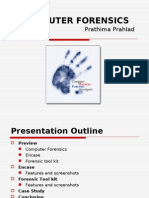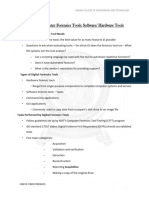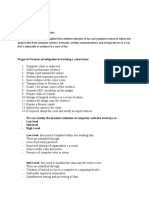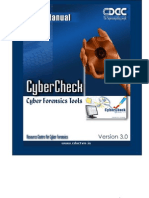Analysis and Validation: Determining What Data To Analyze
Uploaded by
test2012Analysis and Validation: Determining What Data To Analyze
Uploaded by
test20121 Determining What Data to Analyze
! Examining and analyzing digital evidence depends on:
! Nature of the case
! Amount of data to process
! Search warrants and court orders
! Company policies
Analysis and Validation
! Scope creep
! Investigation expands beyond the original description
COMP 2555: Principles of Computer Forensics
Autumn 2014
http://www.cs.du.edu/2555
L11: Analysis and Validation
2 Approaching Computer Forensics Cases
3 Using AccessData Forensic Toolkit
! Process the data methodically and logically ! Supported file systems: FAT12/16/32, NTFS, Ext2fs, and
! Basic steps for all computer forensics investigations Ext3fs
! List all folders and files on the image or drive ! FTK can analyze data from several sources, including
image files from other vendors
! If possible, examine the contents of all data files in all folders
! Starting at the root directory of the volume partition
! FTK produces a case log file
! For all password-protected files that might be related to the ! Searching for keywords
investigation ! Indexed search
! Make your best effort to recover file contents ! Live search
! Identify the function of every executable (binary or .exe) file ! Supports options and advanced searching techniques, such as
that doesn’t match known hash values stemming, phonics, synonyms and fuzzy search
! Maintain control of all evidence and findings, and document ! Analyzes compressed files
L11: Analysis and Validation
L11: Analysis and Validation
everything as you progress through your examination ! You can generate reports
! Using bookmarks
4 Validating with Hexadecimal Editors
5 Validating with Forensics Programs
! Advanced hexadecimal editors offer many features not ! Commercial computer forensics programs have built-in
available in computer forensics tools validation features
! Such as hashing specific files or sectors ! Using hash values to discriminate data
! AccessData has a separate database, the Known File Filter
! Hex Workshop provides several hashing algorithms (KFF)
! Such as MD5 and SHA-1 ! Filters known program files from view, such as MSWord.exe, and
identifies known illegal files
! KFF compares known file hash values to files on your
! Hex Workshop also generates the hash value of selected evidence drive or image files
data sets in a file or sector ! Periodically, AccessData updates these known file hash values
and posts an updated KFF
L11: Analysis and Validation
L11: Analysis and Validation
6 Data Hiding Techniques
7 File Manipulation
! File manipulation ! Easiest method to hide data on a live file system
! Filenames and extensions ! Change the name or extension of the file in question
! Hidden property ! Change the name to a very common one
! Segmentation ! Many malwares run as svchost.exe, which is a very common
process name in Windows
! Disk manipulation
! Change the extension and place in a folder with similar
! Hidden partitions files
! Bad clusters ! Name your file as MSODBC32.dll and place in WinNT/
! Encryption System32
! Bit shifting ! This folder is full of .dll files
! Steganography ! Even the very experienced system administrators do not
know the names of all dll files
L11: Analysis and Validation
L11: Analysis and Validation
! Rootkits ! File signature analysis
! Identifying a file by looking inside it
8 File Manipulation (contd.)
9 File Manipulation (contd.)
! Using the hidden property of files ! File segmentation
! Almost every file system allows a file to be specified as ! Back in the old DOS days, a large file must be split to be able
hidden to carry in floppy diskettes
! Windows: check box in file properties to specify as hidden ! Split a file into multiple segments of arbitrary size
! Unix: any file name starting with a dot is hidden ! Store each segment in a separate location
! Not difficult to detect ! In the disk drive
! As an alternate data stream
! Either change system settings to display all files
! In the registry
! ls -a
! …
L11: Analysis and Validation
L11: Analysis and Validation
10 Hiding Partitions
11 Hiding Partitions (contd.)
! Delete references to a partition using a disk editor
! Re-create links for accessing it
! Use disk-partitioning utilities
! GDisk
! PartitionMagic
! System Commander
! LILO
! Account for all disk space when analyzing a disk
L11: Analysis and Validation
L11: Analysis and Validation
12 Marking Bad Clusters
13 Bit-shifting
! Common with FAT systems ! Old technique
! Place sensitive information on free space ! Shift bit patterns to alter byte values of data
! Use a disk editor to mark space as a bad cluster ! Make files look like binary executable code
! To mark a good cluster as bad using Norton Disk Edit ! Tool
! Type B in the FAT entry corresponding to that cluster ! Hex Workshop
! WinHex
! In Linux, associate good blocks with the bad blocks
inode
L11: Analysis and Validation
L11: Analysis and Validation
14 Using Steganography to Hide Data
15 What’s Common Between These?
! Greek for “hidden writing”
! Steganography tools were created to protect
copyrighted material
! By inserting digital watermarks into a file
! Suspect can hide information on image or text
document files
! Most steganography programs can insert only small amounts
of data into a file
! Very hard to spot without prior knowledge
! Tools: S-Tools, DPEnvelope, jpgx, and tte
L11: Analysis and Validation
L11: Analysis and Validation
16 Both Has This In There!!
17 Rootkits
! A collection of tools and utilities that masks the presence of
malicious activity in a system
! An attacker may devote a whole lot of time in compromising a
system
! Would want to keep the obtained privileges as long as possible
! Replace system binaries to report that everything is normal
! Example: listing processes will not show processes created by the
attacker
! Hook APIs
! Example: filter the output of common programs
! Rootkits operating at the kernel level are very dangerous
L11: Analysis and Validation
L11: Analysis and Validation
! The core functionality of the operating system is questionable
18 Rootkits (contd.)
19 Recovering Passwords
! Detection involves obtaining multiple perspectives of ! Techniques
the problem and look for inconsistencies ! Dictionary attack
! Look for known rootkit files ! Brute-force attack
! Use different tools to obtain running process lists ! Password guessing based on suspect’s profile
! Different tools generate the lists using different techniques ! Many systems do not directly store passwords, but their
Rootkit processes may show up on one
!
hashes
! Analyze installed services (both running and halted) ! Knowing the hash can make recovery attempts faster
! Analyze registry for errant services
! Tools
! Analyze system from a remote system
! AccessData PRTK
! Some hooked APIs can be bypassed this way
! Advanced Password Recovery Software Toolkit
! Use tools to monitor system files added/deleted
L11: Analysis and Validation
L11: Analysis and Validation
! John the Ripper
! Prevention is better than cure!
20 Performing Remote Acquisitions
21 References
! Remote acquisitions are handy when you need to image ! Ch 9: B. Nelson, A. Phillips and C. Steuart, Guide to
the drive of a computer far away from your location Computer Forensics and Investigations. ISBN:
! Or when you don’t want a suspect to be aware of an ongoing 978-1-435-49883-9
investigation
! Remote acquisition software follow a client-server
model to exchange information
! Server component runs on suspect machine providing a
portal into it
! Client component talks to the server and pulls the
information to the target machine
L11: Analysis and Validation
L11: Analysis and Validation
You might also like
- Deep Residual Network For Steganalysis of Digital ImagesNo ratings yetDeep Residual Network For Steganalysis of Digital Images13 pages
- 140 Herramientas Gratuitas para Análisis ForenseNo ratings yet140 Herramientas Gratuitas para Análisis Forense14 pages
- Acquisition and Tools: Planning Your InvestigationNo ratings yetAcquisition and Tools: Planning Your Investigation13 pages
- Practical No 01 Title: Working With Windows Forensic Toolkit (Accessdata FTK) TheoryNo ratings yetPractical No 01 Title: Working With Windows Forensic Toolkit (Accessdata FTK) Theory14 pages
- UNIT IV-Current Computer Forensics ToolsNo ratings yetUNIT IV-Current Computer Forensics Tools5 pages
- Lecture-4 Introduction to Digital ForensicsNo ratings yetLecture-4 Introduction to Digital Forensics44 pages
- LO - 2 - Data Capture and Memory ForensicsNo ratings yetLO - 2 - Data Capture and Memory Forensics51 pages
- Understanding Digital Forensic Tools Their Features, Applicability and Key Short Comings: A Compendium by John SitimaNo ratings yetUnderstanding Digital Forensic Tools Their Features, Applicability and Key Short Comings: A Compendium by John Sitima21 pages
- Guide To Computer Forensics and Investigations Fourth EditionNo ratings yetGuide To Computer Forensics and Investigations Fourth Edition58 pages
- Chapter 8 - Computer Forensics Analysis and ValidationNo ratings yetChapter 8 - Computer Forensics Analysis and Validation30 pages
- Certificacion Ad Forensics 5-Day Parte 2 de 2No ratings yetCertificacion Ad Forensics 5-Day Parte 2 de 26 pages
- Guide To Computer Forensics and Investigations Fourth EditionNo ratings yetGuide To Computer Forensics and Investigations Fourth Edition56 pages
- 1-Reference Material I Cse4004 Digital-Forensics Eth 1.1 47 Cse4004No ratings yet1-Reference Material I Cse4004 Digital-Forensics Eth 1.1 47 Cse400410 pages
- EnCase Forensic Transform Your InvestigationsNo ratings yetEnCase Forensic Transform Your Investigations2 pages
- Week3-Virtual Machine Forensics, Live AcquisitionsNo ratings yetWeek3-Virtual Machine Forensics, Live Acquisitions41 pages
- Computer Forensics Based On What I Have Read: Definition of Computer ForensicsNo ratings yetComputer Forensics Based On What I Have Read: Definition of Computer Forensics4 pages
- Forensic Toolkit: Sales and Promotional SummaryNo ratings yetForensic Toolkit: Sales and Promotional Summary8 pages
- Huawei FireHunter6000 Series Sandbox Brochure PDFNo ratings yetHuawei FireHunter6000 Series Sandbox Brochure PDF5 pages
- Redeye: A Digital Library For Forensic Document Triage: 2. BackgroundNo ratings yetRedeye: A Digital Library For Forensic Document Triage: 2. Background10 pages
- Linux Basics for Hackers OccupyTheWeb Free Download, Borrow, and Streaming Internet ArchiveNo ratings yetLinux Basics for Hackers OccupyTheWeb Free Download, Borrow, and Streaming Internet Archive1 page
- iOS Forensics 101: Extracting Logical And Physical Data From iPhone, iPad And Mac OSFrom EverandiOS Forensics 101: Extracting Logical And Physical Data From iPhone, iPad And Mac OSNo ratings yet
- Python File Handling Made Easy: A Practical Guide with ExamplesFrom EverandPython File Handling Made Easy: A Practical Guide with ExamplesNo ratings yet
- Data Sheet MAXPRO NVR PE Professional EditionNo ratings yetData Sheet MAXPRO NVR PE Professional Edition3 pages
- Control, The Internet Transport Protocols: UDP, TCP, Performance Problems in Computer Networks, Networkperformance MeasurementNo ratings yetControl, The Internet Transport Protocols: UDP, TCP, Performance Problems in Computer Networks, Networkperformance Measurement12 pages
- Pterygium and Associated Ocular Surface Squamous NeoplasiaNo ratings yetPterygium and Associated Ocular Surface Squamous Neoplasia2 pages
- Cyclooxygenase-2 Expression in Primary and Recurrent PterygiumNo ratings yetCyclooxygenase-2 Expression in Primary and Recurrent Pterygium5 pages
- A Survey On Facilities For Experimental Internet of Things ResearchNo ratings yetA Survey On Facilities For Experimental Internet of Things Research14 pages
- Disk Structures: File System Abstraction ModelNo ratings yetDisk Structures: File System Abstraction Model6 pages
- Xiao Steganography: Steganography Is Data Hidden Within Data. Steganography Is An Encryption Technique ThatNo ratings yetXiao Steganography: Steganography Is Data Hidden Within Data. Steganography Is An Encryption Technique That8 pages
- Information Transmission in Crime Branch Using SteganographyNo ratings yetInformation Transmission in Crime Branch Using Steganography2 pages
- Enhancing Security Using Steganography With High Avalanche Effect Encryption AlgorithmNo ratings yetEnhancing Security Using Steganography With High Avalanche Effect Encryption Algorithm6 pages
- Audio Steganography Complete MATLAB Report-1100% (2)Audio Steganography Complete MATLAB Report-165 pages
- A Deep Steganography Approach To Secure Data Transmission in Ad-Hoc Cloud SystemsNo ratings yetA Deep Steganography Approach To Secure Data Transmission in Ad-Hoc Cloud Systems97 pages
- Data hiding Exposing concealed data in multimedia operating systems mobile devices and network protocols 1st Edition Michael T. Raggo 2024 Scribd DownloadNo ratings yetData hiding Exposing concealed data in multimedia operating systems mobile devices and network protocols 1st Edition Michael T. Raggo 2024 Scribd Download55 pages
- Final Year Project Report Manual - Prepration - B - TechNo ratings yetFinal Year Project Report Manual - Prepration - B - Tech17 pages
- Efficiency and Security Optimization For Fingerprint Biometric SystemNo ratings yetEfficiency and Security Optimization For Fingerprint Biometric System90 pages
- F5-A Echo Hidding Algorithm High Capacity Despite Better SteganalysisNo ratings yetF5-A Echo Hidding Algorithm High Capacity Despite Better Steganalysis21 pages
- Download Full Multimedia Security Watermarking Steganography and Forensics 1st Edition Frank Y. Shih (Editor) PDF All Chapters100% (5)Download Full Multimedia Security Watermarking Steganography and Forensics 1st Edition Frank Y. Shih (Editor) PDF All Chapters81 pages
- 2025 Cybersecurity Attacks Playbooks 1739762471No ratings yet2025 Cybersecurity Attacks Playbooks 173976247181 pages
- International Journal of Computational Engineering Research (IJCER)No ratings yetInternational Journal of Computational Engineering Research (IJCER)6 pages
- 499 Project Topics For Computer Science and Engineering (CSE) List 1 - CollegelibNo ratings yet499 Project Topics For Computer Science and Engineering (CSE) List 1 - Collegelib11 pages
- DSP Mini Project Report (Digital Signal Processing) - Image Steganography100% (1)DSP Mini Project Report (Digital Signal Processing) - Image Steganography22 pages
- An Efficient Data Hiding Technique Using Image SteganographyNo ratings yetAn Efficient Data Hiding Technique Using Image Steganography21 pages
- Deep Residual Network For Steganalysis of Digital ImagesDeep Residual Network For Steganalysis of Digital Images
- Acquisition and Tools: Planning Your InvestigationAcquisition and Tools: Planning Your Investigation
- Practical No 01 Title: Working With Windows Forensic Toolkit (Accessdata FTK) TheoryPractical No 01 Title: Working With Windows Forensic Toolkit (Accessdata FTK) Theory
- Understanding Digital Forensic Tools Their Features, Applicability and Key Short Comings: A Compendium by John SitimaUnderstanding Digital Forensic Tools Their Features, Applicability and Key Short Comings: A Compendium by John Sitima
- Guide To Computer Forensics and Investigations Fourth EditionGuide To Computer Forensics and Investigations Fourth Edition
- Chapter 8 - Computer Forensics Analysis and ValidationChapter 8 - Computer Forensics Analysis and Validation
- Guide To Computer Forensics and Investigations Fourth EditionGuide To Computer Forensics and Investigations Fourth Edition
- 1-Reference Material I Cse4004 Digital-Forensics Eth 1.1 47 Cse40041-Reference Material I Cse4004 Digital-Forensics Eth 1.1 47 Cse4004
- Week3-Virtual Machine Forensics, Live AcquisitionsWeek3-Virtual Machine Forensics, Live Acquisitions
- Computer Forensics Based On What I Have Read: Definition of Computer ForensicsComputer Forensics Based On What I Have Read: Definition of Computer Forensics
- Redeye: A Digital Library For Forensic Document Triage: 2. BackgroundRedeye: A Digital Library For Forensic Document Triage: 2. Background
- Linux Basics for Hackers OccupyTheWeb Free Download, Borrow, and Streaming Internet ArchiveLinux Basics for Hackers OccupyTheWeb Free Download, Borrow, and Streaming Internet Archive
- iOS Forensics 101: Extracting Logical And Physical Data From iPhone, iPad And Mac OSFrom EverandiOS Forensics 101: Extracting Logical And Physical Data From iPhone, iPad And Mac OS
- Python File Handling Made Easy: A Practical Guide with ExamplesFrom EverandPython File Handling Made Easy: A Practical Guide with Examples
- Control, The Internet Transport Protocols: UDP, TCP, Performance Problems in Computer Networks, Networkperformance MeasurementControl, The Internet Transport Protocols: UDP, TCP, Performance Problems in Computer Networks, Networkperformance Measurement
- Pterygium and Associated Ocular Surface Squamous NeoplasiaPterygium and Associated Ocular Surface Squamous Neoplasia
- Cyclooxygenase-2 Expression in Primary and Recurrent PterygiumCyclooxygenase-2 Expression in Primary and Recurrent Pterygium
- A Survey On Facilities For Experimental Internet of Things ResearchA Survey On Facilities For Experimental Internet of Things Research
- Xiao Steganography: Steganography Is Data Hidden Within Data. Steganography Is An Encryption Technique ThatXiao Steganography: Steganography Is Data Hidden Within Data. Steganography Is An Encryption Technique That
- Information Transmission in Crime Branch Using SteganographyInformation Transmission in Crime Branch Using Steganography
- Enhancing Security Using Steganography With High Avalanche Effect Encryption AlgorithmEnhancing Security Using Steganography With High Avalanche Effect Encryption Algorithm
- A Deep Steganography Approach To Secure Data Transmission in Ad-Hoc Cloud SystemsA Deep Steganography Approach To Secure Data Transmission in Ad-Hoc Cloud Systems
- Data hiding Exposing concealed data in multimedia operating systems mobile devices and network protocols 1st Edition Michael T. Raggo 2024 Scribd DownloadData hiding Exposing concealed data in multimedia operating systems mobile devices and network protocols 1st Edition Michael T. Raggo 2024 Scribd Download
- Final Year Project Report Manual - Prepration - B - TechFinal Year Project Report Manual - Prepration - B - Tech
- Efficiency and Security Optimization For Fingerprint Biometric SystemEfficiency and Security Optimization For Fingerprint Biometric System
- F5-A Echo Hidding Algorithm High Capacity Despite Better SteganalysisF5-A Echo Hidding Algorithm High Capacity Despite Better Steganalysis
- Download Full Multimedia Security Watermarking Steganography and Forensics 1st Edition Frank Y. Shih (Editor) PDF All ChaptersDownload Full Multimedia Security Watermarking Steganography and Forensics 1st Edition Frank Y. Shih (Editor) PDF All Chapters
- International Journal of Computational Engineering Research (IJCER)International Journal of Computational Engineering Research (IJCER)
- 499 Project Topics For Computer Science and Engineering (CSE) List 1 - Collegelib499 Project Topics For Computer Science and Engineering (CSE) List 1 - Collegelib
- DSP Mini Project Report (Digital Signal Processing) - Image SteganographyDSP Mini Project Report (Digital Signal Processing) - Image Steganography
- An Efficient Data Hiding Technique Using Image SteganographyAn Efficient Data Hiding Technique Using Image Steganography










































































































